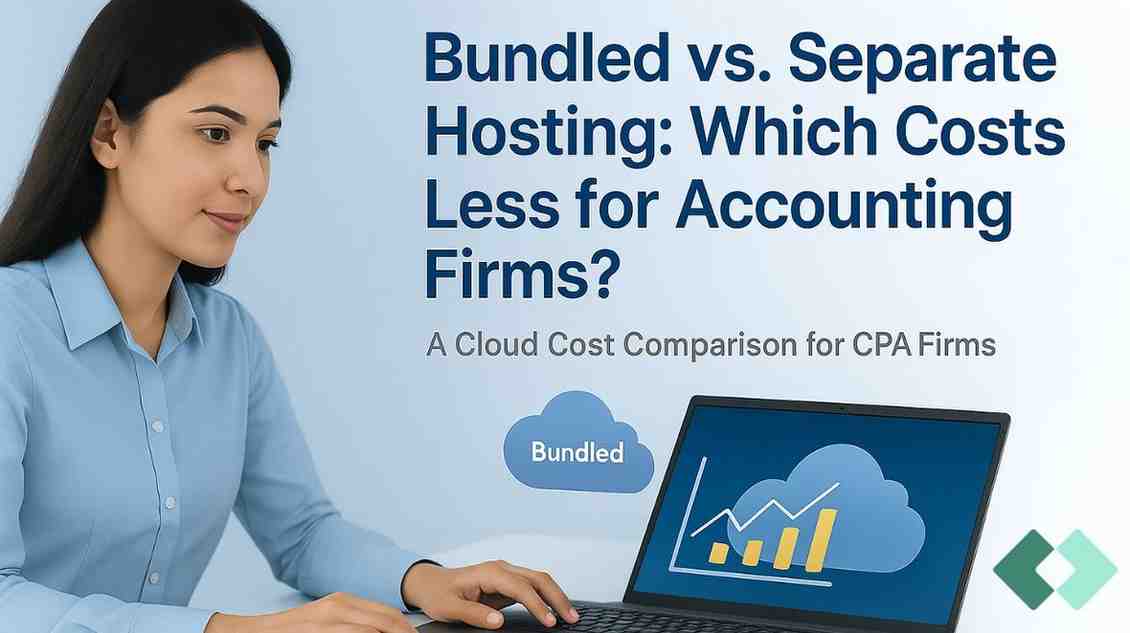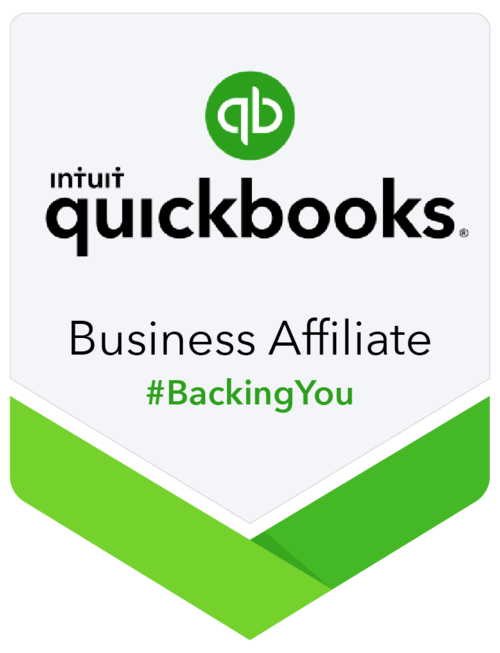Technology infrastructure has become one of the largest controllable expense categories inside accounting firms. Yet hosting decisions are still frequently made by comparing subscription invoices rather than modeling total operational exposure. Accounting firm hosting costs, CPA IT infrastructure cost, and total cost of ownership for cloud environments are increasingly discussed at leadership level — but rarely evaluated holistically.
When firms compare bundled hosting against separate providers without examining administrative labor, downtime risk, compliance coordination, and integration strain, they optimize the visible layer while ignoring structural cost behavior. The financially relevant question is not which invoice is lower. It is which structure produces lower total cost of ownership under real workload conditions.
The Structural Difference That Changes the Economics
Bundled hosting consolidates core systems — bookkeeping platforms, tax software, document management, workflow tools — under one coordinated infrastructure environment. Support, security enforcement, backup retention, and billing operate within a unified framework.
Separate-provider environments distribute those applications across multiple vendors. Each vendor maintains its own infrastructure layer, its own support queue, its own backup standards, and its own billing structure.
At small scale, fragmentation feels manageable. As concurrency increases and workloads spike, coordination burden compounds. Structural complexity begins influencing cost behavior. Structure determines margin behavior over time.
Direct Subscription Cost: The Visible Layer
Most firms begin with per-user pricing. That is rational — it is the most visible expense. However, separate-provider models typically duplicate infrastructure components such as storage thresholds, backup systems, performance allocation, and administrative management. Those layers exist whether they are obvious or not.
Bundled environments consolidate these components into one system. For firms operating eight or more concurrent users across multiple applications, consolidation frequently reduces visible hosting expense by 25–40% annually. But subscription cost is only the first layer.
The 5-Layer Hosting Cost Model™
To evaluate cloud hosting cost accurately, firms must assess all structural layers of expense. The true cost of accounting firm cloud hosting can be modeled across five layers:
- Subscription Layer – Per-user licensing and base hosting fees
- Administrative Layer – Vendor coordination and internal labor overhead
- Downtime Layer – Busy-season performance disruption exposure
- Compliance Layer – Audit documentation and governance coordination
- Integration Layer – Cross-system troubleshooting and maintenance
Most firms evaluate only the first layer. Financial clarity emerges when all five layers are modeled together.
Administrative Coordination: The Hidden Multiplier
Fragmented hosting introduces repetition. User provisioning occurs in multiple environments. Billing reconciliation spans separate invoices. Security reviews and access audits are conducted twice. During performance incidents, internal teams must first determine which vendor owns the issue before resolution begins.
Across a full year, fragmented environments commonly add 40–60 administrative hours. At a blended internal rate of $100 per hour, that equates to $4,000–$6,000 in indirect cost. Bundled hosting centralizes administrative control. Recovered coordination time frequently converts into billable capacity or reduced operational strain during filing deadlines. Indirect cost reduction often outweighs subscription savings.
Downtime Exposure Under Peak Concurrency
Tax season does not create structural weakness — it reveals it. Concurrency frequently rises 40–60% during peak filing periods. In fragmented environments, performance degradation in one system disrupts workflow across the stack. Integration lag, session instability, and slower cross-vendor coordination increase operational risk.
According to IBM’s Cost of a Data Breach Report, operational disruption costs in professional services environments continue to rise annually. While not every outage reaches breach scale, the financial modeling reinforces one reality: interruption has measurable revenue impact.
Professional services benchmarks estimate busy-season downtime costs between $1,500 and $3,000 per hour when lost productivity is considered. Bundled hosting cannot eliminate outages entirely. But unified infrastructure eliminates cross-vendor escalation delay. Faster resolution directly reduces financial exposure. Resolution speed is cost control.
Compliance and Governance Overhead
CPA IT infrastructure cost now intersects with IRS safeguard expectations, cyber insurance underwriting, and client security questionnaires. Separate providers may maintain different encryption standards, backup retention schedules, and logging policies. Audit preparation then requires gathering documentation from multiple vendors.
Bundled hosting centralizes governance oversight. Security controls, logging standards, and backup frameworks operate under one documented structure. While no model eliminates risk completely, coordination complexity decreases. Reduced complexity lowers audit preparation time and minimizes configuration inconsistency. Governance efficiency has measurable financial impact.
Vendor Concentration Risk
Bundled hosting introduces one legitimate trade-off: vendor concentration. When a single provider hosts the entire stack, migration affects all core systems simultaneously. Separate-provider models allow selective vendor replacement.
For this reason, firms must evaluate data export rights, contract flexibility, and migration assistance policies before consolidation.Cost efficiency should not eliminate structural flexibility. Balanced evaluation acknowledges both savings and dependency risk.
What Firms Commonly Miscalculate
Even experienced firms underestimate structural hosting cost. The most frequent miscalculations include comparing per-user subscription rates without modeling administrative coordination, assuming downtime probability is negligible during peak concurrency, ignoring compliance documentation time, and treating vendor flexibility as free rather than operationally expensive.
Fragmented environments rarely fail dramatically. They erode margin incrementally — through friction, small delays, and cumulative inefficiency. Cost erosion is usually quiet.
Quick Self-Assessment: Are You Overpaying?
If your firm answers “yes” to two or more of the following, structural cost may be higher than assumed:
- You reconcile multiple hosting invoices each month
- Vendor coordination slows incident resolution
- Busy-season performance fluctuates under load
- Compliance documentation requires pulling reports from multiple systems
- Administrative time managing vendors exceeds five hours per month
Structural friction is measurable when examined honestly.
Practical Cost Modeling Example
Consider a 12-person firm paying $2,200 per month across separate providers. On paper, annual cost appears to be $26,400.
Now apply the 5-Layer Hosting Cost Model™:
- Administrative Layer: 50 hours × $100 = $5,000
- Downtime Layer: 5 hours × $2,000 peak revenue = $10,000
- Compliance and integration overhead: conservatively $3,000
True annual exposure approaches $44,000.
A bundled environment that reduces coordination and performance risk may compress that total materially. The difference lies in structural modeling — not invoice comparison.
When Bundled Hosting Typically Delivers Lower Total Cost
Bundled hosting tends to produce stronger financial outcomes when a firm:
- Operates five or more concurrent users
- Relies on multiple integrated applications
- Experiences significant busy-season workload spikes
- Lacks dedicated internal IT oversight
- Requires centralized compliance documentation
Separate providers may remain appropriate for very small firms or niche environments requiring modular flexibility. Scale determines economics.
Quick Self-Assessment: Are You Overspending on Hosting?
If your firm answers “yes” to two or more of the following, your total hosting cost may be higher than you realize:
- You manage multiple hosting invoices every month
- Vendor coordination during outages delays resolution
- Busy-season performance fluctuates under heavy load
- Compliance documentation requires pulling reports from separate systems
- Administrative time managing vendors exceeds five hours per month
Fragmented hosting rarely fails dramatically. It erodes efficiency gradually. Understanding this distinction is critical before renewal cycles begin.
Frequently Asked Questions
Not in every scenario. Very small firms may see limited cost difference. However, as user count and system complexity increase, bundled hosting often lowers total cost of ownership.
Administrative coordination and downtime exposure during peak season typically exceed visible subscription differences.
Yes, consolidation increases dependency. Firms should evaluate data export rights and contract flexibility before committing.
That depends on firm size and growth trajectory. Smaller firms may value modular flexibility; scaling firms often benefit more from structural efficiency.
Conclusion
Cloud hosting economics are rarely determined by subscription pricing alone. When administrative labor, concurrency strain, downtime exposure, compliance coordination, and integration friction are modeled realistically, bundled hosting frequently produces stronger total cost control for growing accounting firms.
Separate providers offer flexibility but introduce coordination complexity. For firms beyond minimal scale, structural efficiency often outweighs modular convenience. The disciplined decision is not based on invoice size. It is based on modeled exposure across all five cost layers.
Evaluate Your Firm’s Hosting Strategy Before Busy Season
Before entering another renewal cycle, take a structured look at your total hosting cost, performance risk, and compliance exposure. Even small inefficiencies compound quickly during peak filing periods. A short infrastructure review today can prevent unnecessary cost and operational strain later.
- Book a Demo – See how a consolidated hosting environment operates under real accounting workloads, including performance, backup, and compliance controls.
- Request a Quote – Receive a transparent pricing breakdown based on your users, storage, and application stack.
- Talk to an Expert – Discuss scalability, compliance, and performance benchmarks specific to accounting firms.
Making infrastructure decisions proactively — not reactively — is what separates stable firms from stressed ones during tax season.
You May Also Like These Articles:
- Why CPAs Are Switching from Thomson Reuters Virtual Office Bundled Pricing to Dedicated Cloud Hosting
- The Hidden Cost of Running Virtual Office CS + QuickBooks Hosting Separately (And How to Cut Them)
- How to Evaluate Cloud Hosting for Tax and Accounting Software: A Practical Buyer’s Checklist
- Thomson Reuters Hosting Pricing | OneUp Networks
- Thomson Reuters Cloud Hosting Trends You Can’t Ignore for Tax Season 2026




































